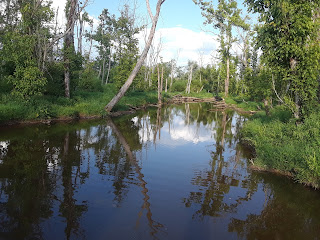The history trap
Growing up in the '70s, Stafford County had a type of effortless segregation that made me wonder where Black classmates went after school. Mostly, I knew them from the simple democracy of the school bus. They stepped off each afternoon and seemed to vanish. I don’t recall entering their homes, eating at a Black family’s table, or sharing their normal lives. Black men sometimes came to our house, and we heard tales of local Black people, like Mrs. Montague, who lived about a mile from the farm -- rumor had it that the old lady had killed her husband. I never learned if that was true. I was also conscious of talk that my mother was a White woman married to a Black man.
But kids wander. Exploring the woods, I sometimes came across an elderly Black man who lived on James Hill (also called Snake Hill), a sinuous rise that overlooks our farm. His tilting shack was off the road, hidden under trees. He was a squatter. He’d made his home from plywood, a window frame, tarpaper, and other scrounged building materials. There was no power or water. The surrounding land was undeveloped, its owner absent. I would see the man from time to time fishing in Potomac Creek, a short walk from his shack down along a disused logging trail. No one else seemed to know he lived there. I was infinitely curious about him. If this sounds like the pitch for a Hollywood movie starring Morgan Freedman, so be it, but he was no Magical Negro in my experience. Our chats were brief and polite; he was probably wary of a kid who’d discovered his place, and liked being alone. He must have died long ago. His shack was leveled to make way for large country homes.
Given enough time, racial exclusion becomes both a cause and an effect. In the 1960s and 1970s, the ideal for immigrants like us was assimilation. My father nailed it, becoming the only native of India I know who shed that unmistakable accent for a vaguely American one. Multiculturalism – e.g., celebrating differences – arrived about twenty years later (and vastly improved the food). Both approaches, assimilation and multiculturalism, have something to offer. But when in elementary school a popular blonde girl innocently asked if I was White or Black, I immediately understood her confusion. Before the influx of Spanish-speaking peoples, Staffordians lived their lives in one or another of two lanes defined by race. I also knew which lane was preferable in every way a boy would measure, and that the girl was presenting me with a rare, and seemingly very valuable, choice. I answered “White.”
Such are the traps laid by history. In 1619, both Virginia’s first elected legislature convened, and its first enslaved African arrived by ship. The fact is that for some peoples Virginia has offered the greatest experiment in liberty in human history; for others, not so much. Political scientists call the rules and norms that regulate how government institutions and society interact a “regime.” Virginia built a property-centered, race-based regime that expelled people of one race from their land and commodified people of another to work it. Even after emancipation – when formerly enslaved people could acquire property rather than be it – sharecropping debt, court-ordered partition sales of “heirs property,” and extralegal actions stopped many Blacks from owning good land. The complicity of Virginians like me has been nearly universal and ensured into the present day by law, violence, and willful miseducation. (1) Smoke that thick doesn’t clear in one or two or five generations.
For the present, this grim and harrowing racial history is keeping elbows sharp. I recently attended an County meeting where a White Board of Supervisors member -- whose online bio says she was “born and raised” in Stafford -- said to her African American colleague, “Well, we just have differences on this matter.” To which her colleague responded, “Yes. I am several shades darker than you.”
(1) I spent over two years in neighboring Spotsylvania County, too. In 2022, the School Board there discussed a ban on books by LGBT and (essentially) non-white authors. A former student of mine, who showed zero inclination to read in college, has supported this effort from his seat on the elected Board.





Comments
Post a Comment